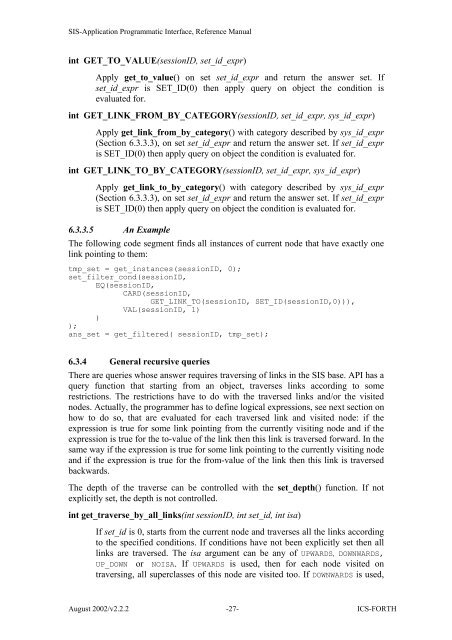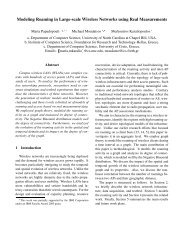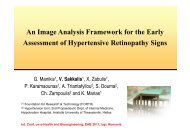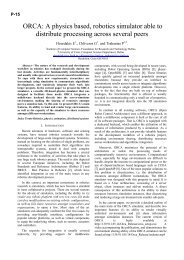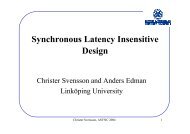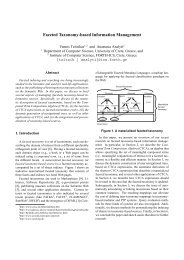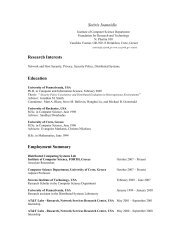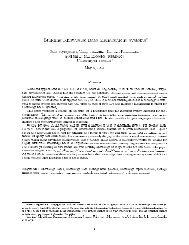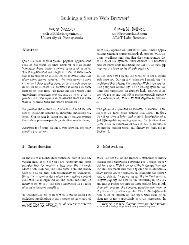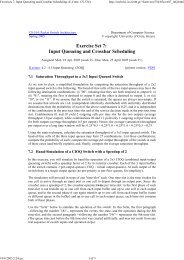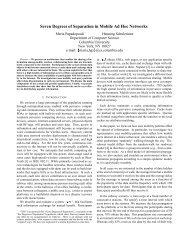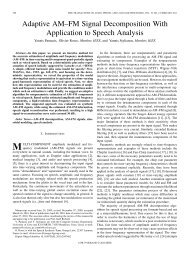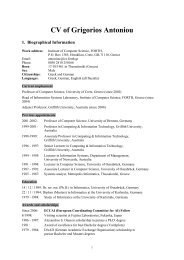SIS - Application Programmatic Interface, Reference Manual - ICS ...
SIS - Application Programmatic Interface, Reference Manual - ICS ...
SIS - Application Programmatic Interface, Reference Manual - ICS ...
Create successful ePaper yourself
Turn your PDF publications into a flip-book with our unique Google optimized e-Paper software.
<strong>SIS</strong>-<strong>Application</strong> <strong>Programmatic</strong> <strong>Interface</strong>, <strong>Reference</strong> <strong>Manual</strong><br />
int GET_TO_VALUE(sessionID, set_id_expr)<br />
Apply get_to_value() on set set_id_expr and return the answer set. If<br />
set_id_expr is SET_ID(0) then apply query on object the condition is<br />
evaluated for.<br />
int GET_LINK_FROM_BY_CATEGORY(sessionID, set_id_expr, sys_id_expr)<br />
Apply get_link_from_by_category() with category described by sys_id_expr<br />
(Section 6.3.3.3), on set set_id_expr and return the answer set. If set_id_expr<br />
is SET_ID(0) then apply query on object the condition is evaluated for.<br />
int GET_LINK_TO_BY_CATEGORY(sessionID, set_id_expr, sys_id_expr)<br />
Apply get_link_to_by_category() with category described by sys_id_expr<br />
(Section 6.3.3.3), on set set_id_expr and return the answer set. If set_id_expr<br />
is SET_ID(0) then apply query on object the condition is evaluated for.<br />
6.3.3.5 An Example<br />
The following code segment finds all instances of current node that have exactly one<br />
link pointing to them:<br />
tmp_set = get_instances(sessionID, 0);<br />
set_filter_cond(sessionID,<br />
EQ(sessionID,<br />
CARD(sessionID,<br />
GET_LINK_TO(sessionID, SET_ID(sessionID,0))),<br />
VAL(sessionID, 1)<br />
)<br />
);<br />
ans_set = get_filtered( sessionID, tmp_set);<br />
6.3.4 General recursive queries<br />
There are queries whose answer requires traversing of links in the <strong>SIS</strong> base. API has a<br />
query function that starting from an object, traverses links according to some<br />
restrictions. The restrictions have to do with the traversed links and/or the visited<br />
nodes. Actually, the programmer has to define logical expressions, see next section on<br />
how to do so, that are evaluated for each traversed link and visited node: if the<br />
expression is true for some link pointing from the currently visiting node and if the<br />
expression is true for the to-value of the link then this link is traversed forward. In the<br />
same way if the expression is true for some link pointing to the currently visiting node<br />
and if the expression is true for the from-value of the link then this link is traversed<br />
backwards.<br />
The depth of the traverse can be controlled with the set_depth() function. If not<br />
explicitly set, the depth is not controlled.<br />
int get_traverse_by_all_links(int sessionID, int set_id, int isa)<br />
If set_id is 0, starts from the current node and traverses all the links according<br />
to the specified conditions. If conditions have not been explicitly set then all<br />
links are traversed. The isa argument can be any of UPWARDS, DOWNWARDS,<br />
UP_DOWN or NOISA. If UPWARDS is used, then for each node visited on<br />
traversing, all superclasses of this node are visited too. If DOWNWARDS is used,<br />
August 2002/v2.2.2 -27- <strong>ICS</strong>-FORTH


